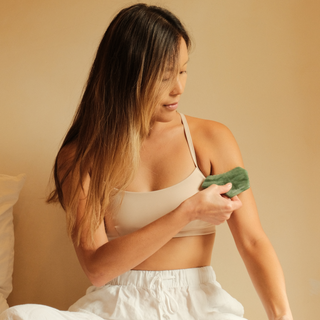In today's fast-paced world, where stress seems to be an inevitable part of our lives, prioritizing self-care becomes paramount. Among the myriad of self-care practices, two stand out for their profound benefits: body massage and Gua Sha. When combined, these practices can work wonders for both your physical and mental well-being, offering a holistic approach to self-care.
The Power of Body Massage
1. Stress Relief:
Stress accumulates in our bodies, manifesting as tension in muscles and knots. A regular body massage helps release this tension, promoting relaxation and reducing stress levels. It allows you to unwind and escape from the demands of daily life, creating a sense of calm and tranquility.
2. Muscle Relaxation:
Whether you lead an active lifestyle or spend long hours sitting at a desk, muscle tension is inevitable. A weekly body massage helps soothe tired muscles, improve blood circulation, and enhance flexibility. It can alleviate aches and pains, promoting better posture and preventing injuries.
3. Improved Sleep Quality:
Poor sleep can have a significant impact on your overall well-being. Body massage has been shown to promote better sleep by stimulating the release of serotonin, a neurotransmitter associated with relaxation and sleep. A weekly massage ritual can help you achieve deeper and more restful sleep, allowing you to wake up feeling refreshed and rejuvenated.
4. Boosted Immunity:
Believe it or not, regular body massage can give your immune system a much-needed boost. By stimulating the lymphatic system, massage helps eliminate toxins from the body, thus enhancing its ability to fight off infections and illnesses. It also reduces the production of cortisol, a stress hormone that can suppress the immune system.
The Art of Gua Sha
1. Improved Circulation:
Gua Sha, an ancient Chinese healing technique, involves scraping the skin with a smooth-edged tool to promote circulation. This gentle scraping action helps stimulate blood flow, bringing oxygen and nutrients to the skin and underlying tissues. Improved circulation can result in a brighter complexion and a more youthful appearance.
2. Detoxification:
Just like body massage, Gua Sha aids in detoxification by encouraging lymphatic drainage. As the tool glides over the skin, it helps to release stagnant lymphatic fluid, allowing the body to rid itself of toxins and waste products. This detoxifying effect can leave you feeling lighter, more energized, and revitalized.
3. Tension Relief:
Gua Sha is particularly effective at relieving tension and tightness in the muscles. The scraping motion helps break up adhesions and knots, promoting relaxation and restoring balance to the body. It can be especially beneficial for areas prone to stiffness, such as the neck, shoulders, and back.
4. Stress Reduction:
Beyond its physical benefits, Gua Sha also has a calming effect on the mind. The rhythmic motion of scraping and the release of tension from the body can induce a state of deep relaxation, reducing stress and anxiety levels. Incorporating Gua Sha into your self-care routine can provide a much-needed respite from the hustle and bustle of daily life.
The Perfect Pairing
Individually, body massage and Gua Sha offer a multitude of benefits for both body and mind. However, when combined, their effects are amplified, creating a synergistic relationship that enhances overall well-being. By incorporating these practices into your weekly routine, you can nurture yourself from the inside out, fostering a deeper connection with your body and promoting long-term health and vitality.
So, why not treat yourself to the ultimate self-care duo? Whether you indulge in a luxurious spa massage or practice Gua Sha at home, investing in your well-being is always worth it. Remember, self-care isn't selfish—it's essential.
Shop our Body Gua Sha + Blossom Body Oil
Use code NEWBLOG to get 50% off *valid from 05/29-06/05

